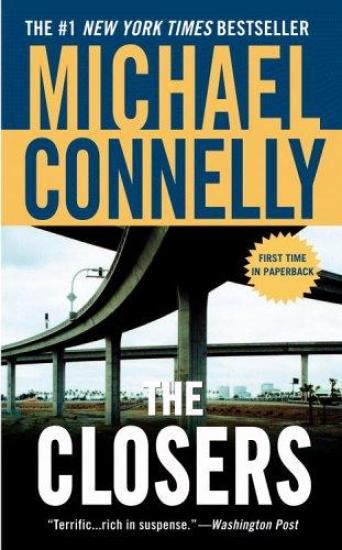
Series: Book 11 in the Harry Bosch series
Rating: ****
Tags: EN-Thrillers, Lang:en
Summary
"A city that forgets its murder victims is a city lost.
This is where we don't forget," Detective Hieronymus "Harry"
Bosch is told by his new boss, as he ends a three-year
retirement and rejoins the Los Angeles Police Department at
the start of
The Closers, the 11th installment of Michael
Connelly's Edgar-winning series. Having long ago demonstrated
his knack for cracking previously unsolved homicides, Bosch
is assigned to the newly re-branded Open-Unsolved Unit (aka
"cold case" squad), and charged with resolving the
17-year-old abduction and slaying of a mixed-race
teenager. Rebecca Verloren, 16, was discovered missing from her
Chatsworth home on a July morning in 1988. Her corpse and the
gun that ended her life were later found on a hill behind the
house. An autopsy revealed that she'd recently undergone an
abortion, and a piece of skin tissue--presumably the
killer's--was found trapped inside the murder weapon. Only
now, though, has DNA science matched that tissue to Roland
Mackey, a dyslexic 35-year-old tow-truck operator with no
obvious connection to the deceased. It's up to Bosch, once
more partnered with Kizmin Rider, to determine whether Mackey
offed Becky Verloren, or was at least an accessory to that
tragedy. But the more Bosch and Rider dig into this dusty
crime, trying in part to determine whether racial animosity
might have been involved, the more pain and resistance they
encounter. Becky's white mother maintains the teen's old
bedroom as a shrine, while her shattered father, an
African-American chef, has vanished into LA's homeless
community. Of the two original investigators on the case, one
has since committed suicide, and Bosch suspects that the
other--now a police commander--is helping to keep the lid
tight on some old departmental secrets, perhaps linked to our
hero's nemesis, Deputy Chief Irvin S. Irving. Understandably rusty after three years sans shield, Bosch
makes his share of personal and professional mistakes
here--including one that supplies
The Closers with a lethal, plot-turning climax. But
the greater problem is that Connelly exhausts so much time
and effort following his protagonist through the tedium of
modern police procedures, that he neglects what readers have
liked more about this series in the past: its persistently
deft exploration of Bosch's lonely, haunted soul (which
remains mostly out of sight in this tale), and the author's
frequent flights of lyrical prose (also not much in
evidence). Would-be novelists wanting an example of a solidly
constructed cop tale need look no further than
The Closers. But readers hoping to learn why
Connelly is so well-respected in this genre should turn,
instead, to previous Bosch titles such as __,
, or .
--J. Kingston Pierce
Starred Review. LAPD detective Harry Bosch, hero of last
year's
The Narrows and other Connelly thrillers, is back on
the force after a two-year retirement. Assigned to the Open
Unsolved (cold cases) unit and teamed with former partner Kiz
Rider, Harry's first case back involves the killing of a high
school girl 17 years before, reopened because of a DNA match
to blood found on the murder gun. That premise could be a
formula for a routine outing, but not with Connelly. Nor does
the author rely on violent action to propel his story;
there's next to none. In Connelly/Bosch's world, character,
context and procedure are what count, and once again the
author proves a master at all. The blood on the gun belongs
to a local lowlife white supremacist, Roland Mackey; the
victim had a black father and a white mother. But the blood
indicates only that Mackey had possession of the gun, so how
to pin him to the crime? Connelly meticulously leads the
reader along with Bosch and Rider as they explore the links
to Mackey and along the way connect the initial investigation
of the crime to a police conspiracy. Most striking of all, in
developments that give this novel astonishing moral force,
the pair explore the "ripples" of the long ago crime, how it
has destroyed the young girl's family—leaving the
mother trapped in the past and plunging the father into a
nightmare of homelessness and drink—and how it drives
Rider, and especially Bosch, into deeper understanding of
their own purposes in life. Connelly comes as close as anyone
to being today's Dostoyevsky of crime literature, and this is
one of his finest novels to date, a likely candidate not only
for book award nominations but for major bestsellerdom.
Agent, Phillip Spitzer. Major ad/promo; 11-city author
tour.
(May 16)
Amazon.com Review
From Publishers Weekly
Copyright © Reed Business Information, a division
of Reed Elsevier Inc. All rights reserved.